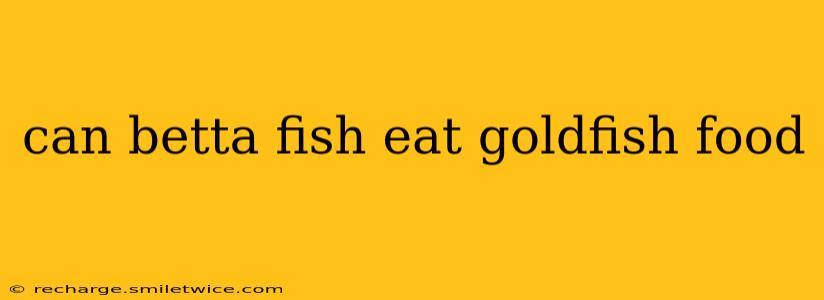Can Betta Fish Eat Goldfish Food? A Deep Dive into Betta Nutrition
Betta fish, with their vibrant colors and flowing fins, are captivating aquarium inhabitants. However, providing them with the right nutrition is crucial for their health and longevity. This leads many owners to wonder: can betta fish eat goldfish food? The short answer is: it's not ideal, and should be avoided as a primary food source. While a tiny amount might not cause immediate harm, relying on goldfish food for your betta's diet can lead to several problems.
This article will explore the nutritional differences between betta and goldfish food, the potential consequences of feeding your betta goldfish food, and offer better alternatives to ensure your aquatic friend thrives.
What are the Nutritional Differences Between Betta and Goldfish Food?
Betta fish and goldfish have different dietary needs. Goldfish are omnivores, requiring a diet that includes both plant and animal matter. Their food often contains a higher proportion of fillers and less protein compared to betta food. Bettas, on the other hand, are carnivores, needing a diet rich in protein to maintain their vibrant health and energy levels. Betta fish food is specifically formulated to meet these high protein requirements. It often includes ingredients like:
- High-quality protein sources: These might include insect larvae, shrimp meal, or krill.
- Essential vitamins and minerals: These are vital for a betta's immune system, growth, and overall wellbeing.
- Lower carbohydrate content: Compared to goldfish food, betta food typically contains less carbohydrates, avoiding potential digestive issues.
Why Shouldn't I Feed My Betta Goldfish Food Regularly?
Feeding your betta goldfish food regularly can have several negative consequences:
- Nutritional Deficiencies: Goldfish food lacks the essential proteins and nutrients vital for betta health. This can lead to weakened immunity, stunted growth, and a duller coloration.
- Digestive Issues: The higher carbohydrate and filler content in goldfish food can upset a betta's delicate digestive system, potentially causing bloating, constipation, or other digestive problems.
- Obesity: The lower protein content in goldfish food means your betta will likely eat more to feel full, contributing to obesity and related health problems.
What Happens if My Betta Eats Goldfish Food Accidentally?
An occasional nibble of goldfish food won't likely cause significant harm. However, it's crucial to ensure this remains an infrequent occurrence, not a regular part of their diet. Monitor your betta closely for any changes in behavior or appetite.
What is the Best Food for My Betta Fish?
The best food for your betta is a high-quality betta-specific pellet food. Look for food that:
- Is specifically formulated for bettas.
- Contains a high percentage of protein (at least 30%).
- Lists specific protein sources like krill, shrimp, or insect larvae.
- Contains essential vitamins and minerals.
- Is small enough for your betta to easily consume.
Can I Supplement My Betta's Diet with Other Foods?
Occasional treats can be a part of a balanced diet. Small amounts of live or frozen foods like bloodworms, daphnia, or brine shrimp can provide additional nutrients and enrichment. However, remember that these should only be supplemental and not replace the primary betta pellet food.
How Often Should I Feed My Betta Fish?
Generally, a healthy betta should be fed 2-3 small meals per day, ensuring that all the food is consumed within a few minutes to avoid water pollution. Overfeeding is a significant problem, so always err on the side of caution.
By understanding the nutritional differences and potential risks, you can ensure your betta thrives with a proper diet. Remember, a healthy betta is a happy betta! Providing your fish with the best nutrition is key to keeping them vibrant, active, and living a long, fulfilling life.
